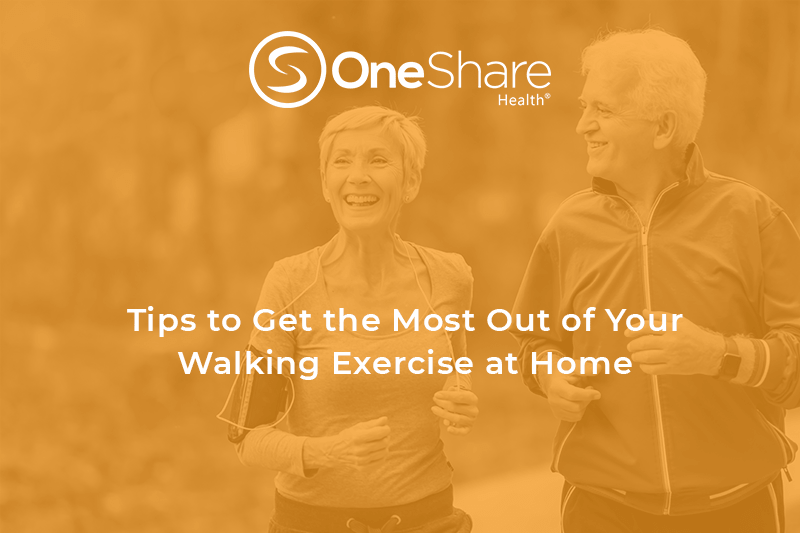When it comes to getting up and moving every day, it really doesn’t get much easier than taking a walk. You don’t need a gym membership or any workout equipment to get outside, breathe some fresh air, and circle the block! Whether you're taking a stroll or walking the dog, the benefits of walking can range from improving your endurance for cardio, lifting your mood, practicing good posture habits, and working a myriad of muscles to give a boost to your overall health!
The benefits of getting your daily steps in through walking are many, so to help you get the most out of walking exercise at home, here are a few form tips to keep in mind to help you create healthy habits. Ready to take a walk? Let’s go!
OneShare Health is unlike Christian ministries health insurance and faith based health insurance. Learn more about Health Care Sharing Ministry Plans and OneShare Health!
Save up to 50% or more on your family's health care! Input your ZIP Code below for a free OneShare Health quote!

Walking Warmups Are Important!
Is walking a good workout? Yes, but you need to ensure you are doing it correctly. As with any type of workout, a good warmup is essential to secure a full range of motion with each step that you take. Before you start your walking exercise at home, your warmup should include a good stretching session and some simple foot and ankle exercises to limber up for your walk. Do these mobility exercises at least once a week for about 3–5 minutes before you take your walk.
How to Stretch Before Walking
Heel Raises
Video Source: Health e-University YouTube
Ankle Push Outs
Video Source: Testosterone Nation YouTube
It’s important to note that walking exercises at home depend greatly on keeping your feet in tip-top shape for taking those steps! Keep up these exercises before and after your walks, and you can help stay free of sprains, strains, and other injuries even if you’re not taking a walk! While on your rest days, you should spend around 10–15 minutes one day a week doing walking stretches and exercising your ankles and feet to create a healthy habit.
We’re Making Great Strides!
All stretched out and ready to hit the pavement? As you take your first steps to warm up for walking, spend about 3–5 minutes gradually increasing the intensity and speed of your stride. If you are comfortable, gradually work up to taking wide, soft strides with a smooth heel-to-toe stepping action and increasing your speed. Be sure you don’t take steps that are too wide!
Keep in mind that increasing your speed or incline too quickly could lead to aches and pains in the body, especially your shins. So be sure to gradually progress your walking plan after adequate walking stretches.
How to Take Heel-to-Toe Steps
Video Source: Rehab and Revive YouTube
If you’re just starting out on walking exercises and this stride is uncomfortable at first, that’s okay! Just gradually work up to it by dedicating short intervals of focused stride-work on one or two walks per week.
- To do this, walk normally 3–5 minutes, then really focus on maintaining heel-to-toe, smooth, soft strides for about 1–2 minutes.
- Then, return to your normal stride for a few minutes and repeat.
- Try to increase the duration of this stride exercise on each walk you take. Eventually, it will become more natural!
Good Walking Posture and You.
Practicing good posture does wonders for your overall health, and in ways you might not expect! Once you figure out how to have good posture and put it into practice, it could help minimize joint strain, aid digestion, and allow you to breathe deep breaths. For example, a slumped-forward, rounded shoulder posture can stress your joints, cause back pain, and could even result in fatigue and breathing issues while you are taking your walk.
What is good posture? Let’s start from the top.
- Keep your head centered over your body and, to help with neck issues, make sure you don’t jut your chin forward.
- Bad posture includes overarching your upper and lower back and tucking your pelvis. So, pull your shoulders back slightly and open your chest. Your pelvis should be under your shoulders and be sure to keep your spine tall.
- Engage your hind leg to always push off with your hips.
- Keep a natural bend in your elbows and allow your arms to swing in opposition to your stepping foot. This arm movement will cause your opposing hip to give you momentum and help keep a natural rhythm while you walk.
How to Have Good Posture While Walking:
Video Source: Rehab and Revive YouTube
To help support your spine and get your body used to this new, improved posture for walking, you may also want to slightly engage your deep abdominal muscles if you’re able. Concentrate on bracing your belly toward your back for several brief periods during your walk but be sure this walking exercise doesn’t affect your breathing or the alignment of your spine and pelvis.
Just as you did with the stride exercises, to help get you into the habit of good walking posture, focus on your good posture during one walk per week. As it becomes easier and more natural to you, you can incorporate good walking posture into every walk!
Uphill Intervals are Great Challenges for Your Body.
So, you’ve mastered the soft, wide walking stride, and have figured out how to have good posture while walking. Now, you’ve come to a hill, just how do you tackle it?
- Your body will shift naturally in order to give you the power to go up an incline. Shorten your stride and focus on pushing down through your glutes. This will assist your thighs as you take steps up the incline.
- Only lean forward slightly so you can avoid straining your back, but remember to keep your shoulders, back, and chest open. Breathe deeply.
- Increase the frequency and span of your arm movements to power up your stride while maintaining that good walking posture!
- Find a steady, slow rhythm to your step as you climb.
Video Source: Sikana English YouTube
Adding more uphill treks to your walking exercise routine is a great way to increase intensity without having to add speed or duration. If you can, try to add an incline interval walk to your stride-work and good posture exercises on one walk per week. This will be a great way to introduce a challenge!
Do you have any basic health tips you use to get the most of your walking exercises? Let us know in a comment!
Learn more about Health Care Sharing Ministry Plans and how OneShare Health OneShare Health is unlike Christian ministries health insurance or faith based health insurance.

Save up to 50% or more on health care!
If you don't want to go the Obamacare route, and also want to save money on your care, check out our Health Care Sharing Ministry that's exempt from the ACA. OneShare Health is an alternative to traditional insurance coverage, we are a Health Care Sharing Ministry that could start saving you thousands per year on your healthcare!
Click below to learn more or get your free OneShare Health quote today.

“Do not neglect to do good and to share what you have, for such sacrifices are pleasing to God.”
1Contributions will vary based on state, Member’s age, Demographics, Program, and Tier.











